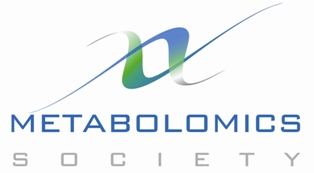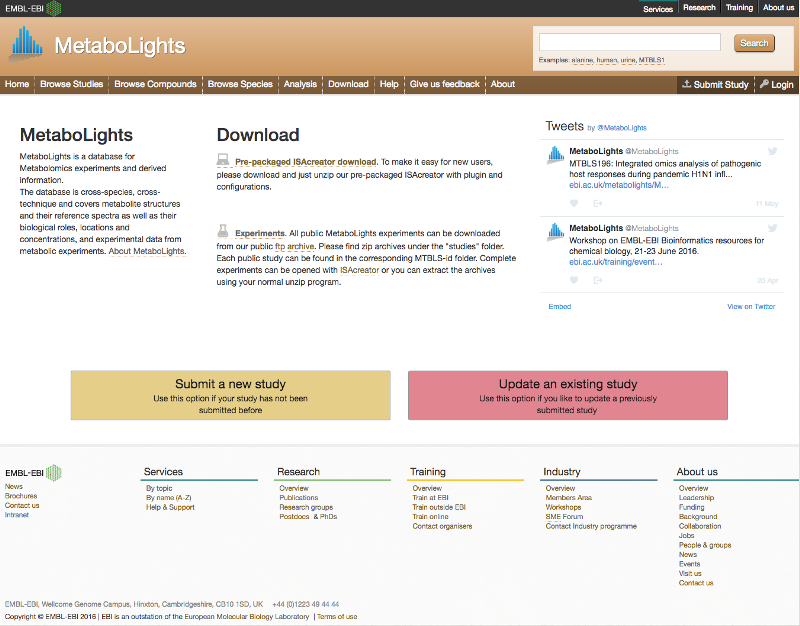
TMIC and the Metabolomics Society
Issue 60 - August 2016
CONTENTS:
Online version of this newsletter:
http://www.metabonews.ca/Aug2016/MetaboNews_Aug2016.htm

 |
| Published
in partnership between TMIC and the Metabolomics Society Issue 60 - August 2016 |
|
CONTENTS: |
|
|
 |
| TMIC
Services |
 |
Metabolomics Society News |
| |
Fellowship Spotlight
|

| |
MetaboInterview
|
| Coordinator
Scientific Curation: Metabolomics and Molecular
Informatics, European Bioinformatics Institute
(EMBL-EBI), UK |
|
 |
Biography Reza got his PhD in Molecular Biophysics and Biochemistry from University College London, UK. He started working in the field of metabolomics in University of Cambridge, over time moving from lab experimental settings towards data analysis and data handling. In the past, he has worked as Scientific Investigator at the Medical Research Council, Cambridge UK. In 2012, he joined EMBL-EBI and currently work as the Coordinator Scientific Curation. At EMBL-EBI, they host the MetaboLights (http://www.ebi.ac.uk/metabolights/), the first general purpose repository for metabolomics data. For Reza, open access data sharing is of paramount importance to metabolomics growth, enabling the community to move a step closer to result reproducibility, a key objective for any scientific field. Here metabolomics standards can play a vital role (http://www.metabolomics-msi.org). Reza has had the opportunity to manage and coordinate a large EU infrastructure project on metabolomics data standards, COSMOS (Coordination of Standards in Metabolomics, http://cosmos-fp7.eu/); this project has re-ignited standards effort within community leaders, in a more bottom-up approach. Such efforts, combined with data sharing in MetaboLights, would benefit the community substantially. Professionally, he's a member of the Cambridge Systems Biology Centre, Cambridge Neuroscience, and Cambridge Cancer Centre. He's the main organizer of the “EMBO Practical Course on Metabolomics Bioinformatics for Life Scientists 2012 - 2016", giving him the opportunity to work with a group of talented and excellent instructors/tutors in metabolomics that share the same passion for metabolomics data handling. He’s one of the directors of the Metabolomics Society, chairing the data standards task group and website committee. He is also one of the directors of the Metabolic Profiling Forum (MPF), where the Metabomeeting conference series are hosted to promote the discussion and debate of the latest developments in metabolomics. Additionally he is Associate Editor for Frontiers Metabolomics Journal. |


 |
Metabolomics Current
Contents
|
Metabolomics Events
|
| 12-16 Sep 2016 |
The Summer School will offer students theoretical sessions with lectures by experts, and hands-on data analysis aimed to deepen the theoretical and practical knowledge for using the main tools available to integrate metabolomics data. Main Topics
Target Audience The Summer School is targeted to researchers at an early stage in their career, from Biological Sciences, Health Sciences and other different background (Including bioinformatics and mathematics) who are interested in learning about both technical and cheminformatics tools to integrate metabolomics data. Applications The course is funded by the Regional Sardinian government and registration will be free of charge for all attendees. Selection will be based on CV and a letter stating the motivations for attending the course and future research plans of candidates. A letter of reference from the current supervisor must also be attached to the application. Registration includes course material, lunches and coffee breaks (not accommodation expenses). For selected participants contribution or reimbursement will be considered. Organizing Committee
For detailed information about the Summer School in Sardinia, visit http://sites.unica.it/metabolomicaclinica/events/. |
| 12-23 Sep 2016 |
|
| 10-12 Oct 2016 |
For further information and registration details, please visit https://www.mri.bund.de/de/ueber-das-mri/veranstaltungen/max-rubner-conference/2016/. |
| 12-14 Oct 2016 |
|
| 15-16 Oct 2016 |
New this year: A focused workshop is available to a limited group of individuals based on availability. Scholarships for scholars and junior faculty are available. For further information and registration details, please visit https://matrix.secureserverdot.com/metabolomics_2016/home_live1.htm. |
| 3-4 Nov 2016 |
The course will be led by experts in the field and include significant hands-on experience using both the Q Exactive and LTQ Orbitrap instruments to perform,
For further information and registration details, please visit http://www.birmingham.ac.uk/facilities/metabolomics-training-centre/courses/metabolite-identification.aspx or contact bmtc@contacts.bham.ac.uk. |
| 23-25 Nov 2016 |
For further information and registration details, please visit http://www.birmingham.ac.uk/facilities/metabolomics-training-centre/courses/q-exactive.aspx or contact bmtc@contacts.bham.ac.uk. |
| 28 Nov to 2 Dec 2016 |
Overview: Pre-processing, statistical analysis, and annotation of metabolomics data is a complex task. The Workflow4metabolomics online infrastructure provides a user-friendly and high-performance environment with advanced computational modules for building, running, and sharing complete workflows for LC-MS, GC-MS, and NMR analysis (Giacomoni et al., 2015). Goals: During this one-week course, participants will learn how to use the W4M infrastructure to analyze their own dataset.Morning sessions will be dedicated to methodology and tools. Afternoon sessions will be devoted to tutoring. Target audience: LC-MS, GC-MS and NMR experimenters (e.g., biologists, chemists) Registration fee: 750 € (Academia) and 1400 € (Industry); Fees include accommodations but not travel expenses Language: English Pre-registration: Monday 30 May 2016 to Friday 15th July 2016 at Workflow4Experimenters course 2016 Contact: contact@workflow4metabolomics.org For further details, visit http://workflow4metabolomics.org/training/W4Mcourse2016. |
| 8-10 Dec 2016 |
Save the date. Program and
registration coming soon: http://www.ican-series.com/ |
| 12-13 Dec 2016 |
Quality Assurance and Quality Control in Metabolic Phenotyping Venue: Birmingham Metabolomics Training Centre, School of Biosciences, University of Birmingham, Birmingham, UK This 2-day course will provide a comprehensive overview of the application of quality assurance (QA) and quality control (QC) in metabolic phenotyping. The course is aimed at students and researchers who are actively working in the field. Experts who have developed the application of QA and QC procedures within the field will lead the course. It will include both theoretical and practical components to
For further information and registration details, please visit http://www.birmingham.ac.uk/facilities/metabolomics-training-centre/courses/quality-phenotyping.aspx or contact bmtc@contacts.bham.ac.uk. |
| 13-17 February 2017 |
EMBO Practical Course on Metabolomics Bioinformatics for Life Scientists Venue: European Bioinformatics Institute (EMBL-EBI) - Training Room 2 - Wellcome Genome Campus, Hinxton, Cambridge, CB10 1SD, United Kingdom Application opens: Monday August 08 2016 Application deadline: Friday November 11 2016 Participation: Open application with selection Contact: Maria Bacadare Goitia Registration fee: £350 Overview This course will provide an overview of key issues that affect metabolomics studies, handling datasets and procedures for the analysis of metabolomics data using bioinformatics tools. It will be delivered using a mixture of lectures, computer-based practical sessions and interactive discussions. The course will provide a platform for discussion of the key questions and challenges in the field of metabolomics, from study design to metabolite identification. Audience This course is aimed at PhD students, post-docs and researchers with at least one year’s experience in the field of metabolomics who are seeking to improve their skills in metabolomics data analysis. Participants ideally must have working experience using R (including a basic understanding of the syntax and ability to manipulate objects). For more information, please visit https://www.ebi.ac.uk/training/events/2017/embo-practical-course-metabolomics-bioinformatics-life-scientists-3. |
| 17-18 May 2017 |
Conference on Food and Nutritional Metabolomics for Health Venue: The Ohio State University, Columbus, OH, USA The purpose of this two-day event is to disseminate state-of-the-art knowledge in the field of food and nutritional metabolomics and foster networking and collaboration among colleagues and industry partners. For more information please visit: https://discovery.osu.edu/focus-areas/foods-for-health/events/conference-2017.html. |
Metabolomics Jobs |
This is a resource for
advertising positions in metabolomics. If you
have a job you would like posted in this
newsletter, please email Ian Forsythe (metabolomics.innovation@gmail.com).
Job postings will be carried for a maximum of
four issues (eight weeks) unless the position
is filled prior to that date.
Jobs Offered
| Job Title | Employer | Location | Posted | Closes | Source |
|---|---|---|---|---|---|
| Researcher Position |
Centro Cardiologico Monzino | Milan,
Italy |
8-Aug-2016 | |
Centro Cardiologico Monzino |
| Postdoctoral Fellow in
Metabolomics/Metabolite Identification |
University of Missouri Metabolomics Center | Columbia,
USA |
8-Aug-2016 | |
University of Missouri |
| Metabolomics Research
Specialist |
St. Jude Children’s Research Hospital | Memphis, Tennessee, USA | 29-Jul-2016 | Until filled |
Metabolomics Society Jobs |
| Metabolomics Staff
Scientist |
St. Jude Children’s Research Hospital | Memphis, Tennessee, USA | 29-Jul-2016 | Until filled | Metabolomics Society Jobs |
| Director, Metabolite
Profiling Core Facility |
Whitehead Institute | Cambridge, Massachusetts, USA | 27-Jul-2016 | 31-Oct-2016 | Metabolomics Society Jobs |
| Postdoctoral Fellow in
Clinical Metabolomics |
Concordia University | Montreal,
Canada |
14-Jul-2016 | 31-Oct-2016 or until
filled |
Concordia University |
| Lecturer/Senior Lecturer
in Systems Genomics |
The University of Melbourne | Parkville,
Australia |
30-June-2016 | 10-Aug-2016 |
The University of Melbourne |
| Senior Experimental
Officer for Untargeted Analytics for
SYNBIOCHEM Centre for Synthetic Biology |
University of Manchester | Manchester,
UK |
28-June-2016 | 10-Aug-2016 |
University of Manchester |
| Project Assistant
Professor in Sustainable Food Security,
Faculty of Life and Environmental
Sciences |
University of
Tsukuba |
Tsukuba, Ibaraki, Japan | 24-June-2016 | Until filled |
Metabolomics Society Jobs |
| Two Postdoc positions
Metabolomics/Bioinformatics |
Leibniz Institute of Plant Biochemistry | Halle,
Germany |
24-June-2016 | 31-Aug-2016 |
Leibniz Institute of Plant Biochemistry |
|
Ian J. Forsythe Double AB, MSc Editor, MetaboNews Department
of Computing Science
University of Alberta 221 Athabasca Hall Edmonton, AB, T6G 2E8, Canada Email: metabolomics.innovation@gmail.com Website: http://www.metabonews.ca Twitter: http://twitter.com/MetaboNews Google+: https://plus.google.com/118323357793551595134 Facebook: http://www.facebook.com/metabonews |
This newsletter is
published in partnership between The
Metabolomics Innovation Centre
(TMIC, http://www.metabolomicscentre.ca/) and
the Metabolomics Society (http://www.metabolomicssociety.org)
for the benefit of the worldwide
metabolomics community.
|